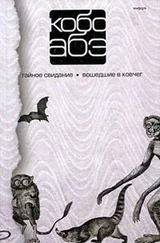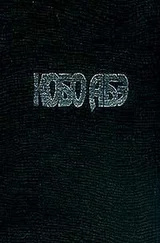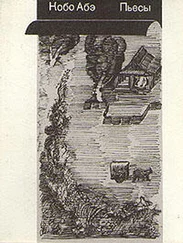Кобо Абэ - The Ark Sakura
Здесь есть возможность читать онлайн «Кобо Абэ - The Ark Sakura» весь текст электронной книги совершенно бесплатно (целиком полную версию без сокращений). В некоторых случаях можно слушать аудио, скачать через торрент в формате fb2 и присутствует краткое содержание. Год выпуска: 1988, Жанр: Современная проза, на английском языке. Описание произведения, (предисловие) а так же отзывы посетителей доступны на портале библиотеки ЛибКат.
- Название:The Ark Sakura
- Автор:
- Жанр:
- Год:1988
- ISBN:нет данных
- Рейтинг книги:3 / 5. Голосов: 1
-
Избранное:Добавить в избранное
- Отзывы:
-
Ваша оценка:
- 60
- 1
- 2
- 3
- 4
- 5
The Ark Sakura: краткое содержание, описание и аннотация
Предлагаем к чтению аннотацию, описание, краткое содержание или предисловие (зависит от того, что написал сам автор книги «The Ark Sakura»). Если вы не нашли необходимую информацию о книге — напишите в комментариях, мы постараемся отыскать её.
The Ark Sakura — читать онлайн бесплатно полную книгу (весь текст) целиком
Ниже представлен текст книги, разбитый по страницам. Система сохранения места последней прочитанной страницы, позволяет с удобством читать онлайн бесплатно книгу «The Ark Sakura», без необходимости каждый раз заново искать на чём Вы остановились. Поставьте закладку, и сможете в любой момент перейти на страницу, на которой закончили чтение.
Интервал:
Закладка:
24
ESCAPE
A flash. Innumerable whips lashed my skin where it was exposed. Then the hatch exploded, eradicating the oceanside entrance. There was no boom such as I had expected to hear, but my eardrums felt an excruciating pain. The light gave way instantly to black darkness. Power failure. The insect dealer switched on his cigarette lighter, its tiny flame emphasizing the vast darkness. His shadow swayed against the wall; the rest of us were totally invisible. Red Jacket’s groaning stopped. Even if he was still groaning, with the ringing in my ears I could never have heard him.
Next there was a distant echo like a crack of thunder, and the whoosh of wind currents crossing and crisscrossing the ark. It had worked.
A warning buzzer went on and off, feeble in my ears after the roar of the blast. As the one who had installed it, I felt a responsibility to make a statement:
“Looks like a nuclear explosion. That signal is the emergency warning.”
No one answered right away.
“It’s an earthquake, isn’t it?” said the girl in a scared voice. “It’s got to be.”
“For an earthquake, I don’t notice many tremors,” said someone — perhaps Sengoku.
“I hate to say it,” I repeated, “but I do think it’s a nuclear explosion.” I wished I could have the insect dealer do the talking for me. “The system is designed to seal us off automatically in case of a nuclear explosion, by dynamiting all tunnels to the outside.”
“I don’t know what kind of sensors you may be using, but how can you be so certain?” The insect dealer’s light came closer, leaving a wavering tail of flame in the air.
“I’m not; I’m just stating the most obvious possibility.”
Darkness in a room or a cave is of varying dimensions. The darkness of, say, a clothes closet can actually be soothing, not frightening in the least. But the vaster the scale, the more menacing darkness becomes. The custom of burying the dead in coffins might have arisen from the desire to protect them from the uncertainty of large darkness by surrounding them with small darkness. Here there were only seven of us, but it sounded like hundreds of fish gasping in a water tank lacking sufficient oxygen.
“I want to know what makes you think so,” said the insect dealer, thrusting the flame of his light toward me. “It could have been set off by a sudden squall, couldn’t it? There’s a front going by. Maybe your sensor is just too sensitive.”
“It’s far more sophisticated than that,” I said, feeling less and less confident in my ability to outtalk this man whose tongue was his fortune. “It’s computer-controlled. There are pressure anemometers at the northern and southern extremities of the mountain, and when the difference in their measurements is greater than one-third, the computer registers it as a local, small-scale disturbance without proceeding to the next stage. Other factors taken into consideration are duration of pressure, presence or absence of a heat wave, rate of temperature climb, and, of course, tests for radioactivity. There’s no way it could be set off by a mere squall.”
Light fell on the tunnel entrance. It was from a large portable lantern hanging from the adjutant’s shoulders, carefully positioned in such a way that his body was visible from the waist down only.
“Excuse me, sir.” His tone hadn’t changed a whit. Nerves of such steely resiliency demanded respect.
“An emergency situation has arisen,” responded the insect dealer. “Possibly a nuclear explosion.” He seemed inclined to affirm that possibility rather than deny it. Flakes of light appeared in the flame of his lighter — a sign he was running out of fuel. “Nuclear weapons are essentially designed to be used in a preemptive strike. It’s common knowledge among military analysts that in all-out nuclear warfare there would be no declaration of war.”
“I’ll go get a lantern,” said the shill, and groped his way upstairs.
“What’s that smell — radioactivity?” It was the young scout.
“No, ding-dong — gunpowder,” said the adjutant flatly. “Powder smoke, it’s called. To a real man it smells sweet as roses.”
“We’ll be safe from radiation in here,” said Sengoku, reassuring himself.
“Is there a radio?” asked the adjutant, and clapped his ear with the palm of his hand. He had apparently received a considerable physical shock.
“There won’t be any broadcasting stations left,” I said. “A one-megaton blast wipes out everything in a three-mile radius. Within a six-mile radius, high winds full of glass fragments whip around.”
“Yes — so if there was reception, that would be a good sign.”
I had to be cautious. This man was not only deranged but fast-thinking. “The walls are so thick I don’t think radio waves would have a chance of getting in. Even if we had a radio.”
“Youknow, Captain,” said the insect dealer, “you should have put everything you had on that bet. You were too fainthearted.” He explained to the adjutant, “The captain and I had a bet going, you see, as to whether or not the bomb would fall in the next twenty-four hours.”
“It was the next five minutes,” I corrected.
“What’s the difference?” said the insect dealer. “Money’s worthless now, anyway. You couldn’t lay wagers even if you wanted to.”
“I know something just as good as money, or better,” persisted the adjutant. “How about those junior high school girls? They’d make perfect stakes.”
Lamplight flashed from the parapet on the bridge, crossing the ceiling in a straight line until it rested on the ruined hatch. The destruction was more complete than I had imagined. The center of the steel door was smashed, and stone rubble had poured through; the shape was that of an expensive Japanese-style confection. The dogs had doubtless been scared out of their wits. The light moved on, fastening on the blue-sheeted corpse, which was covered with several fist-sized chunks of stone. If he hadn’t been a corpse already, he would have been screaming in pain. Maybe he would even have died from the injuries.
Suddenly Sengoku slammed a fist into his palm and hollered, “Then we did it, man! We survived!”
The light vanished, and the shill came down the stairs.
“You mean we’re not dead. That’s all,” retorted the girl glumly.
“We’re alive! We survived!” Sengoku repeated, in tears, and sniffed.
“Now comes the tough part: going on surviving,” said the adjutant, stroking Sengoku with his light. “Commander, what are your instructions?”
“I don’t care — we survived,” said Sengoku again, kicking the floor. “Everybody else has croaked. Right, Mole?”
“Lower your voice, will you?” I said. “You’re giving me a headache.”
There was a percussive sound, clear and carrying, but not sharp; rather like a distant drumbeat. If this was the sound of falling water, then just as I’d hoped, there might have been an alteration in the flow of water underground. I detected a change in the wriggling of the worms in my calf. Was I imagining it? Surely it was too soon for the effects to reveal themselves.
Beaming his lantern ahead of him, the adjutant approached Red Jacket — who, had he stayed where he first was, would almost surely have been severely injured in a fusillade of stones.
“Excuse me, sir!” screamed the young scout.
“Is he dead?” asked the adjutant.
“No, sir.”
“Did he confess?”
“No, sir.”
“Scout A, have you forgotten your orders?”
Just as the adjutant raised his steel-centered broom, the insect dealer issued a brisk, professional command.
“Emergency directive. Divide the Broom Brigade into squads, and assign each squad a turn at the air-purifying equipment. A schedule of shifts will be issued later. All men will be expected to participate in the work of charging batteries with the pedal-operated generators. Choose all those men with mechanical experience, and start work on building a new generator, top speed. Register all men according to their skills, make up a list of names arranged by specialty, and appoint one man in charge of each division.”
Читать дальшеИнтервал:
Закладка:
Похожие книги на «The Ark Sakura»
Представляем Вашему вниманию похожие книги на «The Ark Sakura» списком для выбора. Мы отобрали схожую по названию и смыслу литературу в надежде предоставить читателям больше вариантов отыскать новые, интересные, ещё непрочитанные произведения.
Обсуждение, отзывы о книге «The Ark Sakura» и просто собственные мнения читателей. Оставьте ваши комментарии, напишите, что Вы думаете о произведении, его смысле или главных героях. Укажите что конкретно понравилось, а что нет, и почему Вы так считаете.





